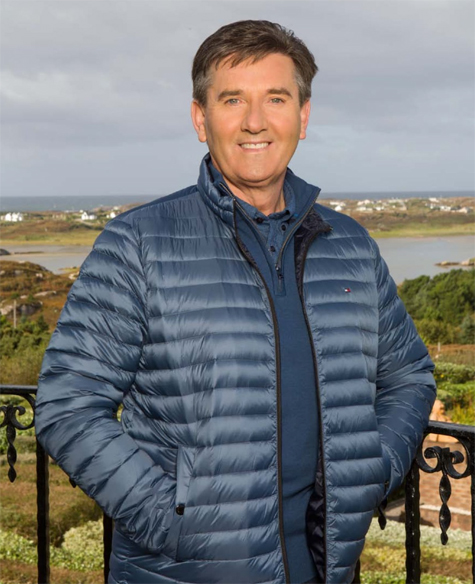By Peter Lindblad
His voice was shot, and that was his meal ticket.
The constant grind of touring and recording in the mid-to-late 1980s and early ‘90s had taken a physical toll on charming, clean-cut Irish singer and entertainer Daniel O’Donnell, just as the U.K., Ireland and even the world was falling under his spell.
“I was just exhausted,” said O’Donnell. “Thankfully, I had no long-term damage to my voice.”
After some much-needed time off, O’Donnell was ready to triumphantly return to the stage in July 1992 at Dublin’s Point Depot, or the Point Theatre as many called it, although it has since changed hands and become 3Arena. O’Donnell initially had some misgivings.
“This was the venue that all the big international acts did their shows in when they came to Ireland, so it was a big undertaking,” said O’Donnell. “My manager at the time, Sean Reilly, and my current manager Kieran Cavanagh, who at the time organized all our Irish shows, decided this should be the venue for my return concert. I have to be honest and say that I thought that it was an ambitious undertaking, but I went with it.”
O’Donnell described it as “a night to remember,” and added, “It was the biggest crowd I had performed in front of to date in one of my own shows. The atmosphere was electric, and I suppose it really was the beginning of the next part of my career.”
In this, his second act, the iconic O’Donnell still elicits that same kind of excitement in any live setting. He will share his captivating vocal stylings with Wisconsin audiences this month, as he’s set to perform at the Crystal Grand Music Theatre in Wisconsin Dells on Sunday, Nov. 19. The set list should please his longtime fans.
“When I go to a show, I always want to hear the songs that are associated with the singer,” said O’Donnell. “With that in mind, I try to sing songs that have been popular for me through the years. We always fit in a few songs from our most recent recordings, too.”
For him, personally, some tunes mean more than others. O’Donnell said “My Donegal Shore” will always be special “because it was the first song I recorded and it got me the recognition I needed at the time.”
“I Need You” was the first song of his to receive airplay on the radio in the U.K., while “Take Good Care of Her” was O’Donnell’s first No. 1 record.
“It’s very hard to pick a favorite song because at different times, different songs have had special meanings,” said O’Donnell.
No place on earth is nearer to O’Donnell’s heart than his County Donegal, Ireland, home, as he grew up in the village of Kincasslagh. Located on the northwest Atlantic coast of the country, it provided him a mostly idyllic childhood, although tragedy struck his family when at age six his father died.
“Everyone knew one another, so there was a great community spirit,” said O’Donnell. “I think for me, even at a young age, the connection with people was very important.”
Being so young, his father’s death didn’t have the same impact for him that it did for his older brothers and sisters. Music helped them get through it. His sister Margaret started singing when Daniel was only two-years-old, and she has had a successful career, topping the Irish charts with “Dear God” in 1968.
“Because of this, we were always very aware of music in our home … especially country music, and the Irish ballads, of course,” said O’Donnell. “She had her own band and toured extensively. I traveled with her as part of her band. I sang a number of songs during every show.”
Daniel actually got his start singing in the church choir. He vividly remembers his initial appearance onstage.
“The first time I sang onstage was in a concert in our local hall,” said O’Donnell. “During Lent, the church used to organize concerts with mainly local acts, and I got the chance to sing at one. I was only about eight-years-old, and I sang a song called ‘My Little Cabin Home on the Hill.’”
O’Donnell hasn’t abandoned his faith or his home church.
“Even today when I’m home, I sing with the choir in our local church,” said O’Donnell. “Growing up the church was the centerpiece of our life. We attended all the services, of which there were many. Today, things have changed, and the church is not as important in many people’s lives, but I still like to attend church when I can. For me, it’s like an anchor that keeps me grounded, or maybe it’s like a rudder that helps me stay on course.”
After two years on the road with his sister, O’Donnell looked to change direction. Realizing he wanted to strike out on his own, O’Donnell started a band and made his first recording in 1983. It was a roll of the dice, as O’Donnell made that first record with his own money and sold all the copies himself.
“I recorded my first record at Big Tom Studios in Castleblayney in County Monaghan on Feb. 9, 1983,” recalled O’Donnell. “I remember feeling very nervous. I actually recorded four songs, but the first recording featured two of them: ‘Stand By Me’ and ‘My Donegal Shore,’ which I released as my first record. I was very fortunate because both of these songs became very popular, especially ‘My Donegal Shore.’ It got a lot of airplay on the local radios all over Ireland. I credit it with getting me my initial recognition in the music business.”
The group he formed that year was Country Fever, which soon broke up. He would form another one. However, O’Donnell experienced a great deal of doubt early on.
“It was difficult in the beginning, and to be honest, from 1983 until 1986, I wasn’t sure if things were going to work out,” said O’Donnell.
Sticking with it, despite his uncertainty, O’Donnell turned things around. In 1985, through his record label and its owner, Mick Clerkin, O’Donnell was introduced to Reilly, who remained his manager for 30 years until retiring.
“There have been a lot of times when things have happened over the years that made my career what it has been,” said O’Donnell. “The first being recording my first record. I then got signed to Ritz Records. At that time, they were having great success in the U.K. with other artists.”
Teaming up with Reilly, O’Donnell began consistently selling out concerts across England – that is until he reached the point of exhaustion.
After his sabbatical, O’Donnell recorded “I Want to Dance With You,” which became a big hit in 1992 in Ireland and across the U.K. Nine years later, O’Donnell recorded a special for PBS, the first of many to feature the singer.
“This got a great reaction all over North America, thus allowing us to tour extensively throughout the U.S. and Canada,” said O’Donnell.
Massive success followed, as O’Donnell amassed 20 U.K. Top 40 albums, with 15 Top 40 singles. He has sold over 10 million records. There have been awards and TV appearances and shows, including a Christmas Day Special. There is even a Daniel O’Donnell Visitors’ Centre in Dungloe, Ireland, which opened in 2012. That’s in County Donegal, of course.
A total of 18 of his albums have landed on the U.S. Billboard World Music Album Chart, and in 2012, O’Donnell became the first artist to have charted at least one new album in the U.K. charts for 25 consecutive years. That streak continued three more years through his 2015 LP The Hank Williams Songbook.
Flash forward to today, and O’Donnell, known for his gentility and charisma, still gets a charge from performing live, having put out his latest LP I Wish You Well about a year ago.
“The enjoyment I get from singing onstage is hard to describe,” said O’Donnell. “The audience ultimately makes the show. When we do our sound check before the people come in, we sing a few of the songs we’ll do in the show. They sound fine, but when we sing them with the audience present, they come to life.”
Advances in technology have allowed O’Donnell and company to create visually appealing stage shows. Ultimately, though, it all comes down to pleasing the audience, and he is famed for the close relationship he has with his fans.
“I suppose the thing that has changed the most is the technology and how it has progressed,” said O’Donnell. “It’s possible now to have images and video that relate to what we are singing projected on to a screen behind us onstage. It does add a lot to the show.”
The most rewarding part of his life, however, occurred in 2002 when he married his wife, Majella. She had two children. The couple is also known far and wide for their philanthropic activities.
“Prior to marrying Majella, if I were asked, I would say that I was happy, but having her in my life has given me joy, contentment and love that I now wouldn’t want to live without,” said O’Donnell. “I feel very blessed that we met when we did. I’m lucky that I’ve been able to be a part of Siobhan’s and Michael’s lives and now to have our two grandchildren, Olivia and Archie, words just can’t describe the joy they bring.”
Now in his 60s, O’Donnell wants to slow down a little, but he hopes to keep on going. Still, he doesn’t know what the future holds.
“I would like to continue to tour, but not as hectic a schedule as I’ve done in the past,” said O’Donnell. “Next year, I’m hoping to only tour about four months of the year and hopefully for future years, I will tour this way. I’m not sure if you’ve heard the saying, ‘How do you make God laugh?’ The answer is, you tell him your plans.”

